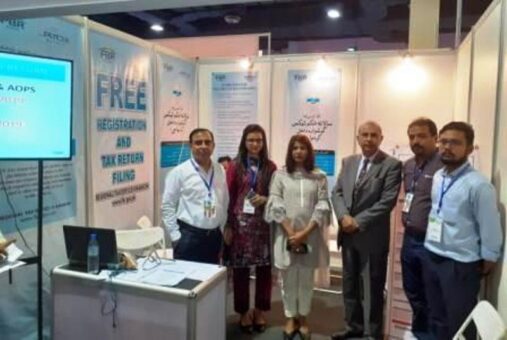KARACHI: Federal Board of Revenue (FBR) on Friday announced transfers and postings of Pakistan Customs Service (PCS) officers in BS-17-19 with immediate effect until further orders.
The FBR notified transfers and postings of following officers:
01. Muhammad Nayyar Shafiq (Pakistan Customs Service/BS-19) has been transferred and posted as Additional Collector, Model Customs Collectorate (AIIA), Lahore from the post of Secretary, Federal Board of Revenue (Hq), Islamabad.
02. Muhammad Irfan Wahid (Pakistan Customs Service/BS-19) has been transferred and posted as Additional Director, Directorate General of Intelligence & Investigation,FBR, Islamabad from the post of Secretary, Federal Board of Revenue (Hq), Islamabad.
03. Engr. Habib Ahmad (Pakistan Customs Service/BS-19) has been transferred and posted as Additional Collector, Model Customs Collectorate of Exports, Custom House, Karachi from the post of Secretary, Federal Board of Revenue (Hq), Islamabad.
04. Ms. Mehreen Naseem (Pakistan Customs Service/BS-19) has been transferred and posted as Secretary, Federal Board of Revenue (Hq), Islamabad from the post of Additional Director, Directorate of Intelligence & Investigation,FBR, Lahore.
05. Muhammad Ahsan Khan (Pakistan Customs Service/BS-19) has been transferred and posted as Secretary, Federal Board of Revenue (Hq), Islamabad from the post of Additional Collector, Model Customs Collectorate of Appraisement, Peshawar.
06. Muhammad Raza (Pakistan Customs Service/BS-19) has been transferred and posted as Additional Collector, Model Customs Collectorate (AIIA), Lahore from the post of Secretary, Federal Board of Revenue (Hq), Islamabad.
07. Adnan Iqbal Sawati (Pakistan Customs Service/BS-19) has been transferred and posted as Additional Collector, Model Customs Collectorate of Appraisement, Peshawar from the post of Secretary, Federal Board of Revenue (Hq), Islamabad.
08. Haroon Waqar Malik (Pakistan Customs Service/BS-19) has been transferred and posted as Additional Collector, Model Customs Collectorate of Preventive, Karachi from the post of Secretary, Federal Board of Revenue (Hq), Islamabad.
09. Rizwan Bashir (Pakistan Customs Service/BS-19) has been transferred and posted as Additional Collector, Model Customs Collectorate of Appraisement (East), Karachi from the post of Secretary, Federal Board of Revenue (Hq), Islamabad.
10. Ms. Dr. Kaukab Farooq (Pakistan Customs Service/BS-19) has been transferred and posted as Secretary, Federal Board of Revenue (Hq), Islamabad from the post of Additional Director, Directorate General of Intelligence & Investigation,FBR, Islamabad.
11. Mushtaq Ali Shahani (Pakistan Customs Service/BS-19) has been transferred and posted as Additional Collector, Model Customs Collectorate of Port Muhammad Bin Qasim, Karachi from the post of Secretary, Federal Board of Revenue (Hq), Islamabad.
12. Afzaal Ahmed (Pakistan Customs Service/BS-19) has been transferred and posted as Additional Collector, Model Customs Collectorate of Appraisement (East), Karachi from the post of Secretary, Federal Board of Revenue (Hq), Islamabad.
13. Ms. Tahira Javed (Pakistan Customs Service/BS-19) has been transferred and posted as Secretary, Federal Board of Revenue (Hq), Islamabad from the post of Additional Collector, Model Customs Collectorate of Preventive, Lahore.
14. Asad Ullah Larik (Pakistan Customs Service/BS-19) has been transferred and posted as Secretary, Federal Board of Revenue (Hq), Islamabad from the post of Additional Collector, Collectorate of Customs (Adjudication-II), Karachi.
15. Ali Raza Turabi (Pakistan Customs Service/BS-18) has been transferred and posted as Second Secretary, Federal Board of Revenue (Hq), Islamabad from the post of Deputy Collector, Model Customs Collectorate of Exports (Port Muhammad Bin Qasim), Karachi.
16. Moeen Afzal Ali (Pakistan Customs Service/BS-18) has been transferred and posted as Deputy Collector, Model Customs Collectorate of Appraisement (East), Karachi from the post of Second Secretary, Federal Board of Revenue (Hq), Islamabad.
17. Mrs. Saher Yasir (Pakistan Customs Service/BS-18) has been transferred and posted as Deputy Director, Directorate of IPR Enforcement (North), Islamabad from the post of Second Secretary, Federal Board of Revenue (Hq), Islamabad.
18. Ubaidullah (Pakistan Customs Service/BS-17) has been transferred and posted as Deputy Director, (OPS) Directorate of Post Clearance Audit, Islamabad from the post of Deputy Collector, (OPS) Model Customs Collectorate, Peshawar.
19. Syeda Sadaf Ali Shah (Pakistan Customs Service/BS-17) has been transferred and posted as Assistant Collector, Model Customs Collectorate of Appraisement (East), Karachi from the post of Assistant Collector, Model Customs Collectorate, Peshawar.
The FBR said that the officers who are drawing performance allowance prior to issuance of this notification shall continue to draw this allowance on the new place of posting.



